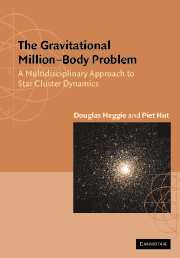Book contents
- Frontmatter
- Contents
- Preface
- PART I INTRODUCTIONS
- PART II THE CONTINUUM LIMIT: N → ∞
- PART III MEAN FIELD DYNAMICS: N = 106
- PART IV MICROPHYSICS: N = 2
- 13 Exponential Orbit Instability
- 14 Two-Body Relaxation
- 15 From Kepler to Kustaanheimo
- PART V GRAVOTHERMODYNAMICS: N = 106
- PART VI GRAVITATIONAL SCATTERING: N = 3
- PART VII PRIMORDIAL BINARIES: N = 4
- PART VIII POST-COLLAPSE EVOLUTION: N = 106
- PART IX STAR CLUSTER ECOLOGY
- Appendix A A Simple N-Body Integrator
- Appendix B Hints to Solution of Problems
- References
- Index
14 - Two-Body Relaxation
Published online by Cambridge University Press: 05 June 2012
- Frontmatter
- Contents
- Preface
- PART I INTRODUCTIONS
- PART II THE CONTINUUM LIMIT: N → ∞
- PART III MEAN FIELD DYNAMICS: N = 106
- PART IV MICROPHYSICS: N = 2
- 13 Exponential Orbit Instability
- 14 Two-Body Relaxation
- 15 From Kepler to Kustaanheimo
- PART V GRAVOTHERMODYNAMICS: N = 106
- PART VI GRAVITATIONAL SCATTERING: N = 3
- PART VII PRIMORDIAL BINARIES: N = 4
- PART VIII POST-COLLAPSE EVOLUTION: N = 106
- PART IX STAR CLUSTER ECOLOGY
- Appendix A A Simple N-Body Integrator
- Appendix B Hints to Solution of Problems
- References
- Index
Summary
As first introduced by Maxwell, the term ‘relaxation’ meant the process by which a deformed elastic body returned to equilibrium. It was then extended to the dynamical theory of gases, where equilibrium is a statistical equilibrium characterised by the particular form of the distribution of energies, and then transferred by Jeans to stellar dynamics. In stellar dynamics equilibrium is never achieved, because particles escape, but one can still think of a ‘quasi-equilibrium’ on the time scale of many crossing times. Even so, in due course the term ‘relaxation’ gradually became applied to several mechanisms which alter such properties as the energies of the stars, whether or not they have anything to do with the approach to equilibrium. More recently it has been argued (Merritt 1999) that the term should be extended further to apply to any one of a variety of mechanisms which cause evolution of the distribution function, whether or not the quantities like energy or angular momentum are altered. The history of the word reflects the development of the subject, from its initial concern with equilibrium models to its modern concern with dynamical evolution.
This chapter deals with one mechanism of relaxation, in which the energy of one star is altered by its interaction with one other. It is often called ‘collisional’ relaxation, though the interaction is entirely gravitational; real collisions we do not discuss until Chapter 31.
- Type
- Chapter
- Information
- The Gravitational Million–Body ProblemA Multidisciplinary Approach to Star Cluster Dynamics, pp. 128 - 142Publisher: Cambridge University PressPrint publication year: 2003



